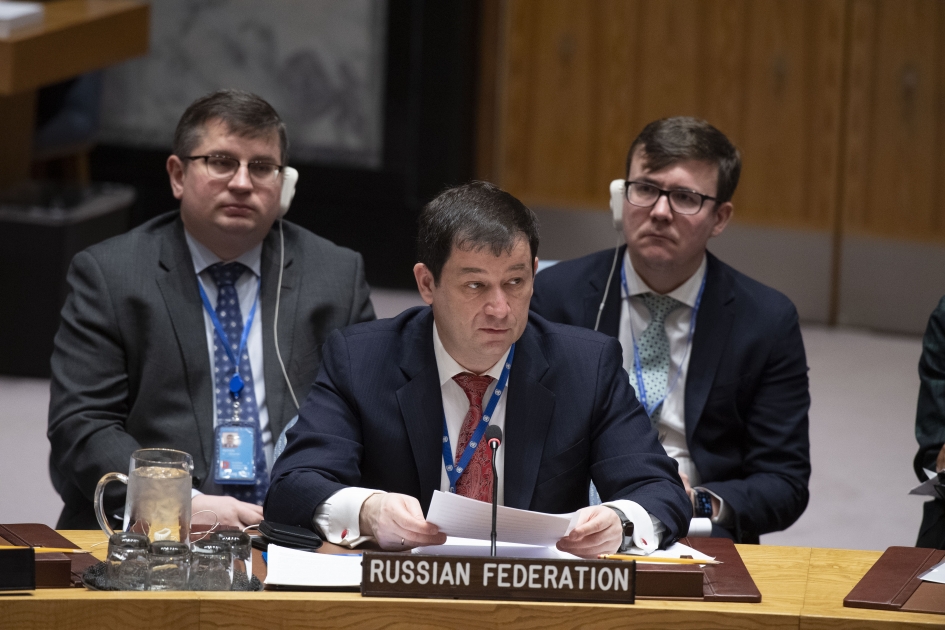Statement by First Deputy Permanent Representative Dmitry Polyanskiy at a UN Security Council briefing on small arms and light weapons
Mr. President,
We thank High Representative of the Secretary-General for Disarmament Affairs Ms.I.Nakamitsu for the presentation of the SG report on small arms and light weapons. We also thank Damien Spleeters for the useful information about the work of NGO “Conflict Armament Research”.
Russia has been standing for increasing UN profile in coordination of global efforts in solving tasks of illicit trade in small arms and light weapons (SALW). The illicit SALW trafficking remains a key source that powers up terrorist and extremist groups, one of the main factors of expansion and escalation of local conflicts, and armed violence.
Despite some progress on a number of tracks, the situation with countering trafficking in SALW on a global scale has seen no significant improvement. The pace of implementation of the UN Programme of Action to Prevent, Combat and Eradicate the Illicit Trade in Small Arms and Light Weapons in all of its manifestations remains insufficient. Practical application of the International Tracing Instrument for Small Arms and Light Weapons is also stalling.
We believe the Programme of Action could be more effectively implemented if there was a ban on transfer of SALW to any actors that are not authorized by the governments of recipient-countries; strict regulation and direct state-executed control of brokerage (intermediary) activity related to arms export throughout the area of this state’s jurisdiction, and maximum limitation of the number of brokers; ban on re-export (subsequent transfers) of the imported SALW without consent of the state that was the initial exporter; prevention of manufacturing of SALW on an expired license or without a license issued by the country that owns the production technology.
Finally, risks of uncontrolled spread of SALW will go down if national control of the entire life cycle of SALW - from production to utilization steps up.
Such measures could proceed from the existing best practices of states, including Russia that has advanced legislation on that matter. We stand ready to consult countries that are interested in looking into the Russian expertise in the area of SALW control. Within the framework of annual accountability, Russia has been consistently submitting reports on the implementation of the Programme of Action. This is a separate well-structured document that gives a comprehensive vision of effective implementation of the Programme at a national level.
At the same time, we cannot fail to mention that the presented report of the Secretary-General contains a number of disputable aspects.
In particular, we have noted that the report suggests extending the UN Register of Conventional Arms by entering a new eighth category of SALW. The existing seven categories already include all major types of conventional arms, the deliveries of which under some conditions can have a destabilizing effect. Besides, when making a decision regarding the eighth category we should also keep in mind some negative precedents of using the Register for uncharacteristic purposes - for example, for defining the scope of arms embargo as was the case with the DPRK and Iran. Pursue of such unthoughtful goals imposes massive limits on the ability of states under sanctions to exercise their right for self-defense that is embodied in Art.51 of the UN Charter, and impedes their law-enforcement activity.
Besides, we believe reference to the International Arms Trade Treaty (ATT) contained in the report is rather dubious. This treaty is far from being universal; it does not let comprehensively solve the tasks that it outlines. For instance, the ATT lacks direct bans on unlicensed manufacturing of arms and their transfer to non-state entities; as well as provisions that would regulate the procedure of re-exporting arms. Practical implementation of the ATT also raises many serious questions. Some of its member states continue to deliver arms to areas of domestic armed conflicts either directly or by proxy.
Mr. President,
In conclusion we would like to point out that Russia shares concerns of the global community regarding an uncontrolled spread of SALW. We stand for further consolidation of global efforts to counter this trend under UN auspices. We agree that we need a comprehensive approach in such matters.
We expect to continue close interaction with all interested stakeholders on these issues during the Biennial Meeting of States to Consider Implementation of the Programme of Action to Prevent, Combat and Eradicate the Illicit Trade in SALW that is pending this year.
Thank you.
